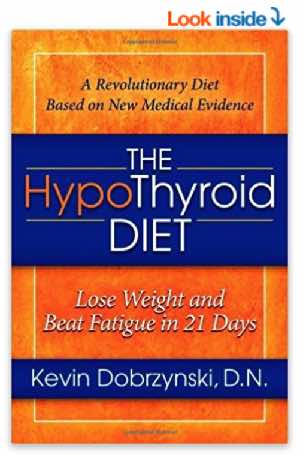Do you, or someone you know, suffer from hypothyroidism?
If so, take a few minutes to read this article and learn how a special hypothyroidism diet can help ease the symptoms and increase the quality of life. Enjoy!
What Is Hypothyroidism?
Hypothyroidism is a common endocrine disorder in which the metabolism is clinically low. The thyroid gland is causing this by producing insufficient amounts of the thyroid hormones T3 and T4.
A person suffering from this disorder can experience a long range of diffuse symptoms such as fatigue, constipation, memory problems, slower metabolism, myxedema, weight gain and feelings of cold. An untreated hypothyroidism will also cause shrinkage of the thyroid gland itself.
A lifelong treatment with synthetic thyroid hormones is the only proven method to fight this disorder. The synthetic T3 and T4 hormones can be administered in combination with each other, in varying ratios, and for some patients give the best results.
There are also patients claiming that natural pig hormones are superior to the synthetic hormones, but this has not been possible to prove scientifically.
Hypothyroidism can have several causes: Medical treatment with radioactive iodine-131, stress, surgical removal of the thyroid gland (or parts of it) and iodine deficiency can all result in hypothyroidism. In addition, up to 9% of women develop it after pregnancy.

Hypothyroidism And Diet
Food intake greatly affects the health of all humans, especially sick people. An unhealthy diet containing lots of fat and sugar will have a very negative effect on both the body and mind, while a balanced and healthy diet will have the exact opposite effect.
Certain foods are not suitable for people suffering from hypothyroidism, while other foods can ease the symptoms, and that is why a special hypothyroidism diet could be beneficial.
As mentioned earlier, the disorder itself can cause weight gain. Combined with fatigue, that will prevent sufferers from exercising, this becomes a dangerous mix. Obesity, depression and high cholesterol could follow, causing even worse health. A hypothyroidism diet will help solve these weight related problems so that all efforts can be focused on the real problem, hypothyroidism.
How Is a Hypothyroidism Diet Designed?
There are many different claims about what a hypothyroidism diet should consist of. Most of these claims have no evidence to back them up, which suggests that some healthy skepticism is in place.
What we do know, is that certain foods should not be consumed at the same time as when the synthetic thyroid hormones are taken. These foods and products should not be consumed within three hours, before or after, from the time of the hormone intake:
- Cottonseed meals
- Soybean flour
- Supplements of calcium and iron
- Walnuts
- Multivitamins that has iron in them
Consuming foods that are rich in iodine and selenium could possibly help the thyroid gland to function better, and thereby produce more T3 and T4. This would, in combination with the synthetic hormones, ease a lot of the symptoms associated with hypothyroidism. These are a few of the most important iodine-rich foods:
- Fish, including sushi
- Seafoods and seaweeds
- Salt that contain iodine
There are claims that certain foods can hinder iodine absorption and thereby making the disease worse. Gluten foods, potato, soybeans and canola oil are some of these foods. We don’t know if this is true, so take it for what it is.
Here are some selenium-rich foods that could benefit the thyroid gland function:
- Milk
- Garlic
- Tuna
- Onion
- Chicken
Apart from the iodine and selenium intake, the best diet for hypothyroidism should be low in fat and sugar to help facilitate weight loss. The patient could otherwise gain excess weight due to his or her condition. It must also contain lots of protein, to prevent the loss of muscle tissue, and lots of vitamins and dietary minerals. A good hypothyroidism diet plan should overall be well-balanced, with the addition of extra iodine and selenium.
Other foods that are potentially harmful (nothing scientifically proven though) for people suffering from hypothyroidism include:
- Coffee
- Mustard
- Peanuts
- Turnips
- Spinach
Take these lists for what they are, speculation and claims without evidence, but with the possibility of being right. Be sure to consult with your medical doctor before making any drastic changes to your diet!
Further Reading
If you would like to learn more about how to create a good hypothyroidism diet, and how it can benefit you, please check out these highly recommended books. They contain a lot of valuable information that could be helpful.
If you find the connection between hormones and body weight interesting, be sure to read about the Cohen diet. It is based on the idea that excess weight is, in many cases, caused by a hormonal imbalance. By following an individually optimized eating plan, based on your blood results, your hormones could get in balance and as a result, you would lose weight. And that’s without exercise. We find the Cohen diet quite interesting.
We hope you enjoyed this article. Thank you for visiting The Diet Expert!



